Today Current Affairs: 25th October 2021 for UPSC IAS exams, State PSC exams, SSC CGL, State SSC, RRB, Railways, Banking Exam & IBPS, etc
Table of Contents
World Meteorological Congress 2021:
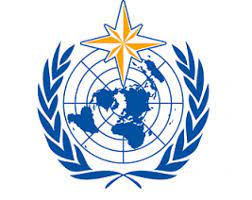
The World Meteorological Congress 2021 has endorsed a Water Declaration, including the Water and Climate Coalition.
- It has also approved a new vision and strategy for hydrology and an associated plan of action.
World Meteorological Congress:
- The World Meteorological Congress is the supreme body of the World Meteorological Organization (WMO). WMO is a specialised agency of the United Nations for meteorology, operational hydrology and related geophysical sciences. India is a member. It produces annually the State of the Global Climate Report.
- Only 40% of countries globally have operational early flood and drought warning systems.
- Some 60% of WMO member countries lack hydrological monitoring capabilities. Globally, more than three billion people have no quality management system for their water-related data in place.
- It means close to half of the world’s population is at risk due to a lack of information on the state of their water resources including rivers, lakes, groundwater, according to the most recent United Nation (UN) estimates.
- Some 107 countries are not on track to have sustainably managed water resources.
- By 2030 early warnings for early action related to floods and droughts will be available for people everywhere on the planet to access.
- Policies for water and climate action developed within the sustainable development agenda will be integrated to yield maximum benefit for people.
- Members will pursue these goals through partnerships for capacity development, knowledge exchange and information sharing, etc.
- The coalition is made for promoting sharing and access to integrated hydrological, cryosphere, meteorological and climate information.
- It aims to boost resilient water adaptation to climate change as well as demographic and socio-economic development for the future.
- It is also aimed at accelerating the progress of water-related United Nations Sustainable Development Goals (SDG), especially SDG6 (water and sanitation for all).
SAKSHAM Centres:
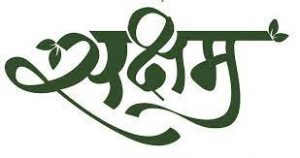
As part of Azadi ka Amrit Mahotsav, a total of 152 Centre for Financial Literacy & Service Delivery (SAKSHAM Centres) across 77 districts of 13 states were launched.
- The centres were launched under Deendayal Antyodaya Yojana – National Rural Livelihoods Mission (DAY-NRLM) of the Ministry of Rural Development.
SAKSHAM Centres:
- Centre for Financial Literacy & Service Delivery (CFL&SD) would act as a one stop solution/single window system for basic financial needs of Self-Help Groups (SHGs) households in rural areas.
- Objective:
- To provide financial literacy & facilitate delivery of financial services (savings, credit, insurance, pensions etc.) to SHG members and rural poor.
- Managed By: SHG network, largely at the level of the Cluster Level Federations (CLFs), with the help of trained Community Resource Persons (CRPs).
- A mobile & web-based application called “SAKSHAM” has also been developed.
- It will be used by the community resource person of the Centre to know the penetration of various financial services for each SHG & village, identify major gaps and accordingly provide training and deliver the required financial services.
Deendayal Antyodaya Yojana-National Rural Livelihood Mission:
- It is a centrally sponsored programme, launched by the Ministry of Rural Development in June 2011.
- Aim: To eliminate rural poverty through the promotion of multiple livelihoods and improved access to financial services for the rural poor households across the country.
- It involves working with community institutions through community professionals in the spirit of self-help which is a unique proposition of DAY-NRLM.
- It impacts the livelihoods through universal social mobilization by inter alia organising one-woman member from each rural poor household into Self Help Groups (SHGs), their training and capacity building, facilitating their micro-livelihoods plans, and enabling them to implement their livelihoods plans through accessing financial resources from their own institutions and the banks.
- It is implemented in a Mission mode by special purpose vehicles (autonomous state societies) with dedicated implementation support units at the national, state, district and block levels, using professional human resources in order to provide continuous and long-term handholding support to each rural poor family.
Sovereign Gold Bond Scheme:

The Central government announced the calendar for Sovereign Gold Bonds (SGB) that will be issued in four tranches, from October 2021 to March 2022.
- The SGB scheme was launched in November 2015 with an objective to reduce the demand for physical gold and shift a part of the domestic savings – used for the purchase of gold – into financial savings.
- The Gold Bonds are issued as Government of India Stock under the Government Securities (GS) Act, 2006.
- These are issued by the RBI (Reserve Bank of India) on behalf of the Government of India.
- Bonds are sold through Commercial banks, Stock Holding Corporation of India Limited (SHCIL), designated post offices and recognised stock exchanges viz., National Stock Exchange of India Limited and Bombay Stock Exchange, either directly or through agents.
- The bonds are restricted for sale to resident individuals, Hindu Undivided Families (HUFs), trusts, universities and charitable institutions.
- Issue Price: Gold bond prices are linked to the price of gold of 999 purity (24 carats) published by India Bullion and Jewellers Association (IBJA), Mumbai.
- Investment Limit: Gold bonds can be purchased in the multiples of one unit, up to certain thresholds for different investors.
- The upper limit for retail (individual) investors and HUFs is 4 kilograms (4,000 units) each per financial year. For trusts and similar entities, an upper limit of 20 kilograms per financial year is applicable.
- Minimum permissible investment is 1 gram of gold.
- Term: The gold bonds come with a maturity period of eight years, with an option to exit the investment after the first five years.
- Interest Rate: A fixed rate of 2.5% per annum is applicable on the scheme, payable semi-annually.
- The interest on Gold Bonds shall be taxable as per the provision of Income Tax Act, 1961.
Global Agricultural Productivity Report (GAP Report):
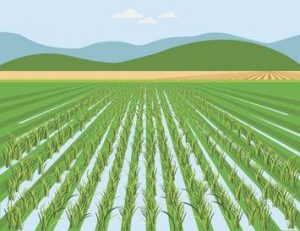
According to a new report, Global agricultural productivity is not growing as fast as the demand for food, amid the impact of climate change.
- The report was released in conjunction with the World Food Prize Foundation’s annual conference.
Findings of the Report:
- Total Factor Productivity (TFP) is growing at an annual rate of 1.36% (2020-2019).
- This is below the Global Agricultural Productivity Index that has set an annual target of 1.73% growth to sustainably meet the needs of consumers for food and bioenergy in 2050.
Factors Responsible for Low TFP Growth:
- TFP growth is influenced by climate change, weather events, changes in fiscal policy, market conditions, investments in infrastructure and agricultural research and development.
Situation in Different Regions:
- Drier Regions (Africa and Latin America): Climate change has slowed productivity growth by as much as 34%.
- High-Income Countries (in North America and Europe): Modest TFP growth.
- Middle Income Countries (India, China, Brazil and erstwhile Soviet republics): Strong TFP growth rates.
- Low-Income Countries (Sub-Saharan Africa): TFP is contracting by an average of 0.31% per year.
Significance of Productivity Growth:
- Destruction of Forest Areas: 36% of the world’s land is used for agriculture. Forests and biodiverse areas will be destroyed for planting or pasture.
- Diet-Related Diseases: USD 2T in economic losses and 4 million deaths are attributed to diet-related diseases each year.
- Soil Degradation: 90% of the earth’s soils could be degraded by erosion by 2050.
- Methane Emissions: 37% of methane emissions from humans influenced activity come from cattle and other ruminants.
- Loss of Irrigation Water: 40% of irrigation water is lost due to inefficient irrigation.
- Water sources will be depleted, making prime agricultural land unusable.
G7 Digital Trade Principles:
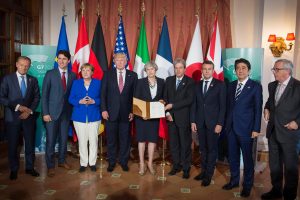
The Group of Seven (G7) wealthy nations agreed on a joint set of principles to govern cross-border data use and digital trade.
- The deal is a first step in reducing trade barriers, and could lead to a common rulebook of digital trade.
- Earlier, India attended the 47th G7 Summit as a guest country.
- Digital Trade: It is broadly defined as trade in goods and services that is either enabled or delivered digitally, encompassing activities from the distribution of films and TV to professional services.
G7 Digital Trade Principles:
- Open Digital Markets: Digital and telecommunications markets should be competitive, transparent, fair, and accessible to international trade and investment.
- Cross Border Data Flows: To harness the opportunities of the digital economy and support the trade of goods and services, data should be able to flow freely across borders with trust, including the trust of individuals and businesses.
Safeguards for Workers, Consumers, and Businesses: Labour protections must be in place for workers who are directly engaged in or support digital trade, providing decent conditions of work. - Digital Trading Systems: To cut red tape and enable more businesses to trade, governments and industry should drive forward the digitisation of trade-related documents.
- Fair and Inclusive Global Governance: Common rules for digital trade should be agreed and upheld at the World Trade Organization (WTO).
- These rules should benefit workers, consumers, and businesses in developing economies, as well as those in developed economies, while safeguarding each country’s right to regulate for legitimate public policy objectives.
Public Safety Act (PSA):

After the killings of non-locals in Jammu and Kashmir around 700 people have been detained in the union territory, a few under the stringent Public Safety Act (PSA).
Powers of government under the Public Safety Act:
- Also called the Jammu & Kashmir Public Safety Act (PSA), 1978, it is a preventive detention law.
- Under this law, a person is taken into custody to prevent him or her from acting in any manner that is prejudicial to “the security of the state or the maintenance of the public order”.
- The law allowed the government to detain any person above the age of 16 without trial for a period of two years.
- It allows for administrative detention for up to two years “in the case of persons acting in any manner prejudicial to the security of the State”, and for administrative detention up to one year where “any person is acting in any manner prejudicial to the maintenance of public order”.
- It comes into force when administrative orders are passed either by Divisional Commissioner or the District Magistrate.
- The detaining authority need not disclose any facts about the detention “which it considers to be against the public interest to disclose”.
- Section 22 of the Act provides protection for any action taken “in good faith” under the Act: “No suit, prosecution or any other legal proceeding shall lie against any person for anything done or intended to be done in good faith in pursuance of the provisions of this Act.
Singapore International Arbitration Centre (SIAC):

The Singapore-based arbitrator, SIAC, has rejected Future Retail’s plea to lift the interim stay on its ₹24,713-crore deal with Reliance Retail, giving a major relief to Amazon that is contesting the transaction.
- This order now restrains Future Group and Reliance Industries Limited from proceeding with a Rs 24,713-crore deal signed in August for Future Retail to sell its retail, wholesale, logistics and warehousing units to Reliance Retail and Fashionstyle.
- The parties in a deal usually sign a contractual agreement which specifies about:
- The arbitral institution administering the arbitration.
- The applicable rules.
- The seat of arbitration.
- In this case Amazon and Future Group have under their agreement agreed to refer their disputes to SIAC, with Singapore presumably being the contractual choice for the seat/place of arbitration.
- Once a dispute is referred to arbitration, the process of appointment of the arbitral tribunal takes place.
- Composition: Typically, in case of a three member tribunal, both the parties appoint one member each to the tribunal, while the third member is jointly appointed by the two nominees or, if they fail to agree, by SIAC.
Turkey On FATF Grey List:
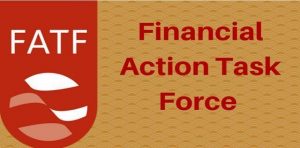
The Financial Action Task Force (FATF) has added Turkey, along with Jordan and Mali, in its revised list of “jurisdictions under increased monitoring”, also known as the FATF grey list. There are now 23 countries in the list.
- If countries fail to prevent international money laundering and terrorist financing, then they shall be placed on the list.
- According to the FATF, when a jurisdiction is placed under increased monitoring, “it means the country has committed to swiftly resolve the identified strategic deficiencies within agreed timeframes and is subject to extra checks”.
- The FATF took two countries — Botswana and Mauritius — out of the grey list. It is because these countries had made significant progress in addressing the strategic AML/CFT (Anti-Money Laundering/Combating the Financing of Terrorism) deficiencies identified earlier by the FATF and included in their respective action plans.
Blacklist and grey list:
- Black List: Countries known as Non-Cooperative Countries or Territories (NCCTs) are put in the blacklist. These countries support terror funding and money laundering activities. The FATF revises the blacklist regularly, adding or deleting entries.
- Grey List: Countries that are considered safe haven for supporting terror funding and money laundering are put in the FATF grey list. This inclusion serves as a warning to the country that it may enter the blacklist.
Uighurs:
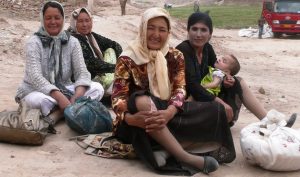
Forty-three countries have called on China to “ensure full respect for the rule of law” for the Muslim Uighur community in Xinjiang.
- The declaration accused China of a litany of human rights violations against the Uighurs, including torture, forced sterilisation and forced disappearances.
- China should allow immediate, meaningful and unfettered access to Xinjiang for independent observers, including the UN High Commissioner for Human Rights and her office.
- Credible reports indicate that over a million people have been arbitrarily detained in Xinjiang and that there is widespread surveillance disproportionately targeting Uighurs and members of other minorities and restrictions on fundamental freedoms and Uighur culture.
- Despite mounting evidence, China denies mistreating the Uyghurs, and goes on to insist it is simply running “vocational training” centres designed to counter extremism.
- The Uighurs are a predominantly Muslim minority Turkic ethnic group, whose origins can be traced to Central and East Asia.
- The Uighurs speak their own language, similar to Turkish, and see themselves as culturally and ethnically close to Central Asian nations.
- China recognises the community only as a regional minority and rejects that they are an indigenous group.
- Currently, the largest population of the Uighur ethnic community lives in the Xinjiang region of China.
- A significant population of Uighurs also lives in the neighbouring Central Asian countries such as Uzbekistan, Kyrgyzstan and Kazakhstan.
- Uighur Muslims for decades, under the false accusation by the Chinese government of terrorism and separatism, have suffered from abuses including persecution, forced detention, intense scrutiny, surveillance and even slavery.




